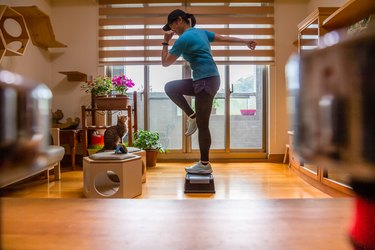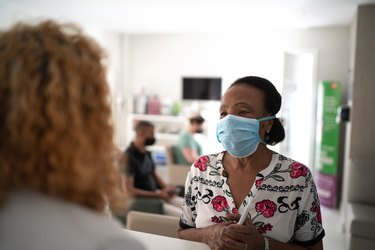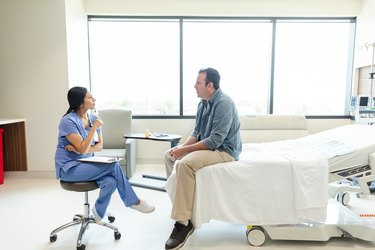
Fifty is an important milestone age — after all, you've officially lived half a century. This phase of life is a good time to reflect on how far you've come, but also remember you still have plenty left to live.
Thanks to advances in medicine, we're living much longer than we used to. In fact, the average life expectancy is just over 76 years, according to the Harvard T.H. Chan School of Public Health.
Video of the Day
Video of the Day
Despite living longer, we're still getting a handful of health issues as we age, which can reduce our quality of life. That means, in order to stay in tip-top shape, we have to make a conscious effort to maintain our health.
Here, learn some important health goals adults in their 50s can make this year, as recommended by health experts.
A Note on Language
Here at LIVESTRONG.com, we try to avoid using gendered language in favor of more inclusive terms. Still, some medical sources and health experts use terms like "men" and "women," and we've kept that language intact here to avoid any misunderstandings.
1. Increase Your Physical Activity
We spoke with internal physicians, registered dietitians, physical therapists and other health experts, and they all echoed the same top tip: Stay active.
Physical exercise is important for everyone, but millions of adults in their 50s aren't as active as they should be, according to the Centers for Disease Control and Prevention. (In other words, many people in this age range aren't getting the recommended minimum of 150 minutes of moderate-intensity exercise like brisk walking each week.)
"It is important to be active, especially as we get older," says David Nazarian, MD, a board-certified internist in Beverly Hills, California. "Staying active in your 50s will help you remain independent as you age, or better able to take care of yourself without help from others."
Regular exercise is also good for your overall health and can reduce your risk of certain diseases.
While researchers estimate a decline in life expectancy due to the increase in illnesses like diabetes, heart disease and stroke, physical activity has been shown to help prevent these kinds of long-term chronic diseases, per a December 2019 review in Sports Medicine and Health Science.
Making a conscious effort to get more movement can look like taking the stairs more often, or going for a daily walk. Any amount of physical activity is better than none, so do what you can if you're just getting started.
Over time, you can gradually increase your exercise and incorporate different types, like strength training.
Christynne Helfrich PT, DPT, a physical therapist in Lake Bluff, Illinois, recommends incorporating strength training exercises to increase muscle mass and strength, which can help prevent age-related injuries (like bone fractures) later on.
2. Eat More Anti-Inflammatory and Antioxidant-Rich Foods
When it comes to overall health, regular exercise and a balanced diet go hand-in-hand. For adults in their 50s, Dr. Nazarian especially recommends pairing exercise that gets your heart rate up with a diet rich in nutrients like protein and fiber.
If you feel like you've already got your nutrition down, Maggie Moon, RD, a Los Angeles-based registered dietitian who specializes in brain health, recommends focusing specifically on foods that reduce inflammation and provide antioxidants.
These include fruits and veggies (especially dark berries and dark leafy greens), beans, nuts and seafood (especially oily fish like salmon).
Not only are these foods good for your general health, but they're especially beneficial for your brain health, she says.
"The brain is one of our most metabolically active organs and it has an out-sized need for antioxidant and anti-inflammatory nutrients to perform at its best," Moon says.
Tip
While brain disorders like Alzheimer's disease and dementia usually begin around age 65, early signs of dementia can crop up well before then. If you notice you're having memory loss or more subtle signs of cognitive decline such as mood changes, trouble completing tasks or changes in judgment, talk to your doctor about getting tested.
3. Get Age-Appropriate Cancer Screenings
Unfortunately, aging is the biggest risk factor for developing cancer, according to the National Cancer Institute.
But thankfully, getting certain cancer screenings can catch abnormalities early, which can up your odds of beating the disease. That's why it's important to get all the tests your doctor recommends based on your age and sex.
For example, in your 50s, your doctor might recommended skin cancer or colon cancer screenings. This is also around the time when prostate and breast cancer screenings are encouraged.
"Many people begin to develop skin cancer in their 50s," says Thomas Griffin, MD, a board-certified dermatologist in Philadelphia. "If you spend a lot of time outside, have a history of sunburns or a family history of skin cancer, you should take your skin cancer screenings seriously — be consistent and start early."
It's recommended to get regular skin cancer screenings once a year, according to the Skin Cancer Foundation. But you may need them more often if you're an older adult, have a family history of skin cancer or have moles or other skin conditions.
And as rates of colon cancer increase, it's important to stay on top of routine colonoscopies, says Andrew Boxer, MD, a board-certified gastroenterologist at Gastroenterology Associates of New Jersey.
"All patients 50 years and older need a colon cancer screening," he says. In fact, the American Cancer Society recommends people at average risk for the disease start getting screened regularly at age 45.
A colonoscopy is the most common and effective way to screen for colon cancer. "Not only does a colonoscopy detect colon cancer, it can also prevent it," Dr. Boxer says.
Tip
One of the best ways to reduce your risk of skin cancer is by wearing sunscreen every day, Dr. Griffin says.
4. Stay on Top of Your Regular Checkups and Blood Work
As you get older, you might start seeing your primary care doctor more often than you used to. Aside from various screenings, you still need to make it in for your annual checkups and blood work.
"If you haven't received a routine physical in a while, it's important to do so in your 50s," Dr. Nazarian says.
"It's also recommended to get a comprehensive blood panel to check for vitamin deficiencies, high cholesterol, prostate issues, type 2 diabetes, kidney issues, thyroid issues and more," he adds.
Even if your blood work comes back within normal ranges, it's good to have these baseline numbers to refer back to. You can also use these appointments to ask your doctor about any other screenings you should get.
Additionally, people in their 50s assigned female at birth (AFAB) should make an annual trip to their gynecologist, says Jared Braunstein, DO, a board-certified internist with Medical Offices of Manhattan.
"They should see their gynecologist annually for breast and pelvic exams, as well as annual mammograms," Dr. Braunstein adds.
5. Prioritize Your Bone Health
At a certain age, your bone mass may start to decline. Bone loss accelerates around the age of 50, especially in people going through postmenopause, according to John Hopkins Medicine.
While the health of your bones can be easy to overlook, several doctors we spoke to emphasized the importance of maintaining bone health as you age.
One of the most common bone disorders to look out for is osteoporosis. It may be difficult to detect, though, because it's considered a "silent disease," according to the Bone Health and Osteoporosis Foundation.
Osteoporosis also disproportionately affects people AFAB. Researchers estimate that roughly half of women over the age of 50 will have an osteoporosis-related fracture, per a March 2017 review in the European Journal of Rheumatology.
"Postmenopausal women should have bone density exams to screen for osteoporosis and osteopenia every two years," Dr. Braunstein says.
"Women in this age group should also focus on getting enough calcium in their diets and adding weight-bearing exercises to keep bones strong," he adds.
6. Learn a New Skill
It's important to keep your brain sharp as you age, and one way to do so is by learning something new. Maybe you've always wanted to play a musical instrument or take up painting — there is no better time to start than now.
The "old dogs can't learn new tricks" rhetoric is false here, by the way: Older adults can (and should) learn new tasks, per the National Institute on Aging.
"Learning new things and keeping your brain stimulated can prevent you from falling in a slump or feeling stagnant in life," says Jeff Sounalath, LPC, an Austin-based therapist.
"You can enjoy all the hard work you've put in over the years, but that doesn't mean you can't have goals and aspirations you still want to achieve," Sounalath says.
- CDC: "Adults 50 and Older Need More Physical Activity"
- Harvard T.H. Chan School of Public Health: “What’s behind ‘shocking’ U.S. life expectancy decline—and what to do about it”
- Sports Medicine and Health Science: “Physical activity, exercise, and chronic diseases: A brief review”
- National Cancer Institute: “Age and Cancer Risk”
- American Cancer Society: “American Cancer Society Guideline for Colorectal Cancer Screening”
- John Hopkins Medicine: “Osteoporosis: What You Need to Know as You Age”
- Bone Health and Osteoporosis Foundation: “What is Osteoporosis and What Causes It?”
- European Journal of Rheumatology: “An overview and management of osteoporosis”
- National Institute on Aging: “How the Aging Brain Affects Thinking”
- Cleveland Clinic: "Vitamin D Deficiency"
- Johns Hopkins Medicine: "Early-Onset Alzheimer's Disease"
- Skin Cancer Foundation: "Annual Exams"
Is this an emergency? If you are experiencing serious medical symptoms, please see the National Library of Medicine’s list of signs you need emergency medical attention or call 911.






